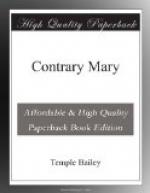He drew a long breath, and looked up through the singing tree-tops to the bit of sky above. He stood there for a long time, silent, looking up into the shining sky.
At ten o’clock when he entered the circle of young pines, his congregation was ready for him, sitting on the rough seats which the men had fashioned, their eager faces welcoming him, their eyes lighted.
The children whom he had taught led in the singing of the simple old hymns, and Roger read a prayer.
Then he talked. He withheld nothing of the poetry of his subject; and they rose to his eloquence. And when light began to fill a man’s eyes or tears to fill a woman’s—Roger knew that the work of the soul was well begun.
Afterward he went among them, becoming one of them in friendliness and sympathy, but set apart and consecrated by the wisdom which made him their leader.
Among a group of men he spoke of politics. “There’s the new President,” he said; “it has been a great week in Washington. His administration ought to mean great things for you people down here.”
Thus he roused their interest; thus he led them to ask questions; thus he drew them into eager controversy; thus he waked their minds into activity; thus he roused their sluggish souls.
But he found his keenest delight in the children’s gardens.
They were such lovely little gardens now—with violets blooming in their borders, with daffodils and jonquils and hyacinths. Every bit of bloom spoke to him of Mary. Not for one moment had she lost her interest in the children’s gardens, although she had ceased, it seemed, to have interest in any other of his affairs.
Before he went, the children had to have their fairy tale. But to-night he would not tell them Cinderella or Red Riding Hood. The day seemed to demand something more than that, so he told them the story of the ninety and nine, and of the sheep that was lost.
He made much of the story of the sheep, showing to these children, who knew little of shepherds and little of mountains, a picture which held them breathless. For far back, perhaps, the ancestors of these sand-hill folk had herded sheep on the hills of Scotland.
Then he sang the song, and so well did he tell the story and so well did he sing the song that they rejoiced with him over the sheep that was found—for he had made it a little lamb—helpless and bleating, and wanting very much its mother.
The song, borne on the wings of the wind, reached the ears of a man with a worn face, who slouched in the shadow of the pines.
Later he spoke to Roger Poole. “I reckon I’m that lost sheep,” he said, soberly, “an’ nobody ain’t gone out to find me—yit.”
“Find yourself,” said Roger.
The man stared.
“Find yourself,” Roger said; “look at those little gardens over there that the children have made. Can you match them?”




